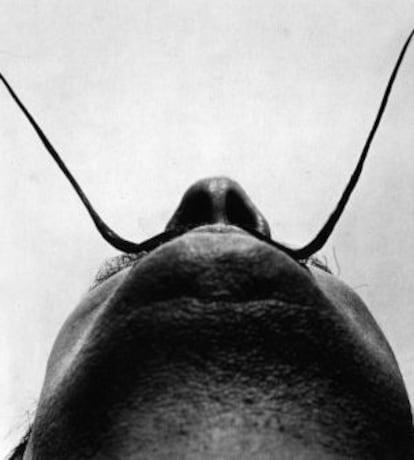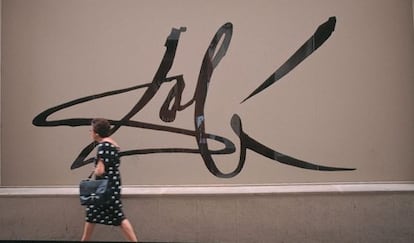Dalí’s last laugh from the grave
Artist’s final act of theater caused resentment among his fellow Catalans as he cheated them of his legacy


On January 30, 1989, eight days after Salvador Dalí died in Figueres at age 84, the same kind of controversy that had accompanied him throughout life broke out in death: the Surrealist artist's last will, made out in September 1982, declared the Spanish state the sole heir of his entire estate.
This document cancelled out an earlier testament dating from 1980, in which the surrealist giant had expressed a wish to leave half of his assets to Spain and the other half to the Catalan government.
From that moment, 700 paintings, 3,000 drawings and watercolors, a few masterpieces of Surrealism such as The Great Masturbator and Hitler's Enigma, two houses (one in Figueres, the other in Port Lligat (Cadaqués), a castle in Púbol, some shorefront land and all of his paperwork became the property of the Spanish Culture Ministry.
It was Dalí's ultimate coup de theater, a way of delivering a kick from the grave. And for decades, Catalonia has been unable to accept it.
As Robert Descharnes, the artist's secretary, would later write, the first time Dalí met the Catalan premier once democracy had been restored after the death of Franco, was in May 1981, inside a hotel suite in Paris. As Jordi Pujol, for decades the undisputed leader of Catalan nationalism, sat back to contemplate one of Dalí's works, the painter placed himself next to him and broke wind loudly.
The genius from Figueres associated the premier's surname with that of Joseph Pujol, "Le Pétoman," a comedian who performed at the Moulin Rouge, where he farted out his own peculiar version of La Marseillaise. It was Dalí's way of breaking the ice, but this sonorous encounter could only have had a negative influence on his later relations with Catalan authorities.
Dalí was never a favorite of Catalan nationalists or the regional intelligentsia. Several major retrospectives of his work, which have attracted hundreds of thousands of visitors abroad and in Madrid (the last one, held at the Reina Sofía museum in 2013, drew over a million) remarkably did not stop in Barcelona.
Dalí worked hard to be this hated. He confessed to a fascination — but no political affinities — with Hitler, was close to Franco, rejected all forms of nationalism and was critical of the gurus of Catalan culture. Towards the end of his life, few people remembered that Dalí was once arrested at age 19 for holding up a Catalan flag as he rowed into the port of Cadaqués, or that he always showed off his Catalan origins by showing up for events wearing a barretina hat and espadrilles.
After paying for his funeral, the Catalan government was shocked to learn about the contents of the new will. The regional authorities' attempts at getting Dalí to give them his entire estate, rather than just half, had failed. In fact, they'd produced the opposite effect.
"[Former premier] Pujol visited him several times, as did his adviser Max Cahner. They wanted to ingratiate themselves with Dalí and bring him closer to Catalonia, and to that purpose he'd been awarded the [Catalan government] Generalitat's Gold Medal in 1981," recalls Daniel Giralt Miracle, who played an active role in the negotiations with Madrid in his capacity as director of the Contemporary Art Museum.

When the will was read out, Jordi Pujol stated that "we feel betrayed, though we don't know by whom," while Cahner did not hesitate to declare Dalí a "coward" and asserted that the Spanish Culture Ministry was "a representative of the occupying forces."
Madrid denied any previous knowledge of Dalí's last will, or that it had influenced him in any way. Jorge Semprún, the writer who had served as Spain's culture minister between 1988 and 1991, wrote in his memoirs that during Dalí's funeral, "I kept looking sideways at Pujol and felt the urge to laugh my head off." This was widely held to mean that he had already known about the last will.
In any case, it is certain that Madrid had won the battle for the artist's favors. In 1981 Dalí's lawyer, Miguel Domènech — brother-in-law to Transition-era Prime Minister Calvo Sotelo — had worked hard to resolve the artist's delicate financial situation: he got the tax authorities to forgive his late payments, and brought back to Spain all the work that was scattered in New York, Geneva and Paris. The Spanish state did not want his legacy to end up abroad, as had happened with Picasso. So it gave Dalí medals and King Juan Carlos made him a marquis in 1982. According to Javier Tusell, who was director general of the government's Fine Arts Agency between 1979 and 1982, that is when they put together a Dalí retrospective that opened in 1983 in Madrid and Barcelona.
Four days after the will was read, at the first meeting between central and regional authorities, Semprún made it clear that Dalí's estate would in fact be shared out, since Catalonia also had rights to it. A committee was created to determine which artworks would go to the Reina Sofía in Madrid and which ones to Figueres and Barcelona. In the end, 56 works went to the Reina Sofía and 134 to Figueres. Barcelona was left without any.
"That was a decision by the Catalan government — the Ministry had nothing to do with it," explains Jaime Brihuega, another former head of the Fine Arts department. "The Spanish state could have acted arrogantly and kept it all, since legally it was allowed to do so."
Brihuega notes that the deal was an amicable one, but that today's tense relations between Madrid and Catalonia would make such an agreement impossible. "I hope nobody uses the 25th anniversary of his death to make demagogic statements about the Spanish state sacking and pillaging, which is what some nationalists will inevitably do," he adds.
Too late. Albert Pont, president of Cercle Català de Negocios (CCN), a pro-independence lobby representing small and medium businesses, has already stated that one of the things that Catalonia must demand back once it achieves independence is Dalí's work in Madrid.
Brihuega notes, however, that the art on display at the Dalí Theatre-Museum in Figueres is still technically the property of the Spanish state, meaning that the claims could flow in the opposite direction. "In the event of independence, there would be a tremendous legal battle."
Tu suscripción se está usando en otro dispositivo
¿Quieres añadir otro usuario a tu suscripción?
Si continúas leyendo en este dispositivo, no se podrá leer en el otro.
FlechaTu suscripción se está usando en otro dispositivo y solo puedes acceder a EL PAÍS desde un dispositivo a la vez.
Si quieres compartir tu cuenta, cambia tu suscripción a la modalidad Premium, así podrás añadir otro usuario. Cada uno accederá con su propia cuenta de email, lo que os permitirá personalizar vuestra experiencia en EL PAÍS.
¿Tienes una suscripción de empresa? Accede aquí para contratar más cuentas.
En el caso de no saber quién está usando tu cuenta, te recomendamos cambiar tu contraseña aquí.
Si decides continuar compartiendo tu cuenta, este mensaje se mostrará en tu dispositivo y en el de la otra persona que está usando tu cuenta de forma indefinida, afectando a tu experiencia de lectura. Puedes consultar aquí los términos y condiciones de la suscripción digital.








































